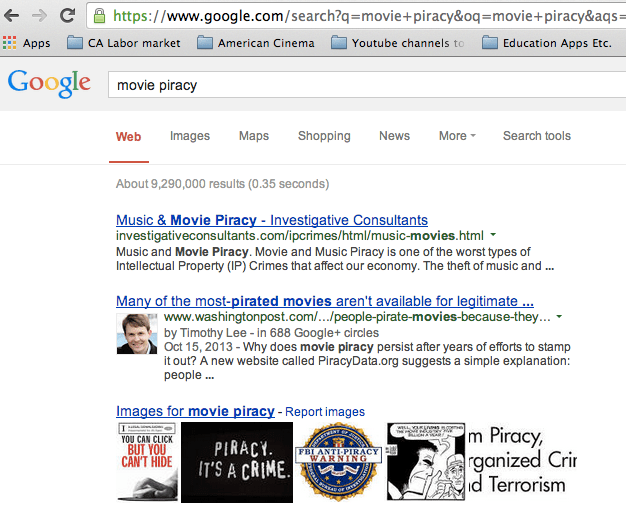Ukranians faced off riot police yesterday in Independence Square, a tense scene that ended peacefully for now, with police forces withdrawing. The protests are sparked by anger over president Viktor Yanukovich’s apparent stonewalling on signing a trade deal with the EU that would further emancipate the fledgling democracy from its former Soviet occupiers. The pact would bring badly needed investment into the nearly-bankrupt country of 46 million and help break the stranglehold Russia has on its industrial sector as the sole supplier of natural gas. Meanwhile, what are Americans and other citizens who enjoy diverse economies quibbling about? What movies are available online of course.
My colleague at Vox Indie, Ellen Seidler brought it to my attention that a Google search for “movie piracy” will presently bring up as the second result an October 15th article written by Timothy B. Lee, a libertarian with views generally hostile toward copyrights. Lee offers yet another variation on the message “piracy is a reaction against industry failure” by pointing to a handful of top movies that are supposedly unavailable to stream or purchase online through paid services yet. Although the central fact is exaggerated — some of the movies cited are available — Lee unblushingly quotes fellow libertarian and team leader of Piracydata.org, Jerry Brito, thus:
“The MPAA is complaining that Google leads people to infringing links, but what’s the alternative?” The movies that are available on file-sharing sites, he says, are “very rarely available for legal acquisition.”
Oh the humanity! What is the alternative indeed? What will my long-suffering fellow countrymen do of an evening if they cannot find a recently released movie on demand? Are they to risk carpal tunnel searching aimlessly? Or watch something else, like maybe a film with an older release date? Or (perish the thought) read something???? What is the point of living in a free and culturally diverse society? What is this, Ukraine??
If you’re an American, everything about this search result should worry you, and everything it’s communicating should embarrass you. As for the worrisome part, if you read Ellen Seidler’s post about Lee and Brito and the Mercatus Center, the information-control process looks like this: a user types in a broad search term like “movie piracy,” Google ensures that this pro-piracy article is the number two result, and the body of the article promotes the agenda of from an organization that is heavily funded by anti-labor, anti-civil-liberties forces like the Koch Brothers. As many of us keep saying, the anti-copyright agenda is effectively an anti-fair-trade, anti-labor, anti-collective-bargaining agenda disguised as a pro-liberty agenda, and that brings us to the part that should embarrass you. Because this message only works if you the user really believe that instant, round-the-clock access to all content is a right tantamount to a civil liberty. If you honestly believe that, read about Ukraine this week. This is a nation hungry for a diverse economy, and I’ll bet the Ukranians would dearly enjoy a rich IP sector modeled after countries like the U.S., where artists are rewarded instead of, you know, jailed. By contrast, people like Lee and Brito sound a hell of a lot like my kids complaining that there’s nothing to watch on television.










Thanks for this, David.
Interestingly, another David–David Simon, creator of THE WIRE–launched a full-on broadside against libertarianism that is definitely worth a look.
Thanks. Is this the “Two Americas” piece? Was just bout to read that.